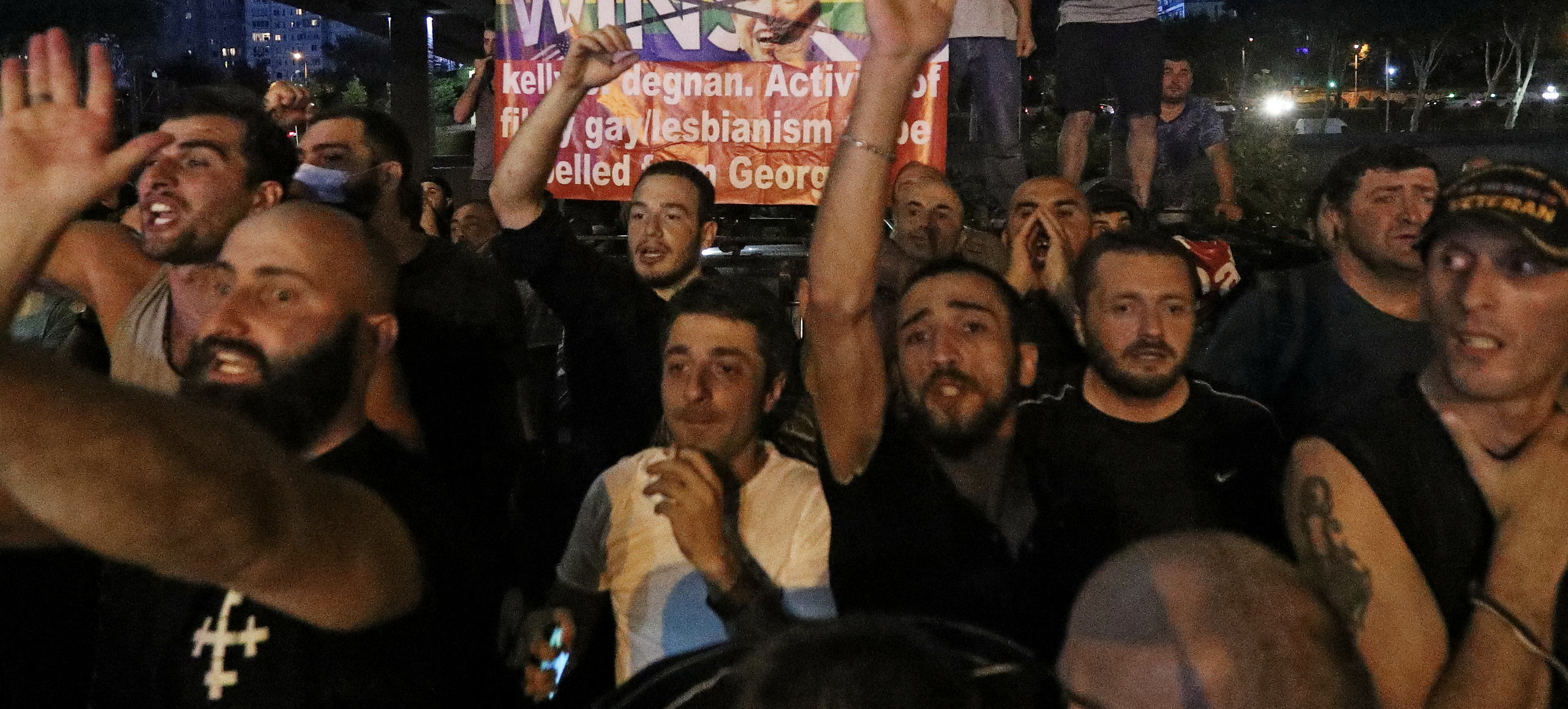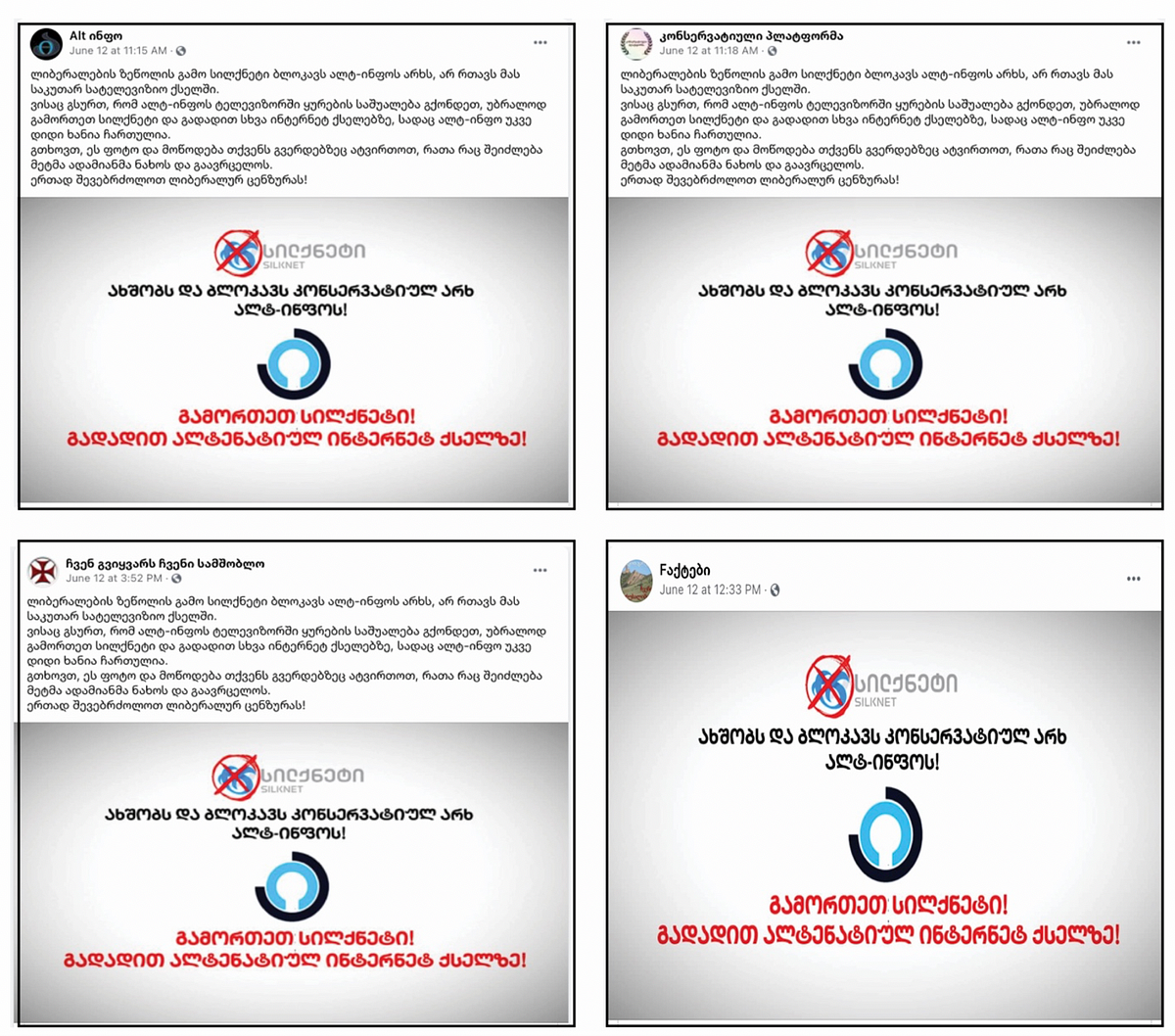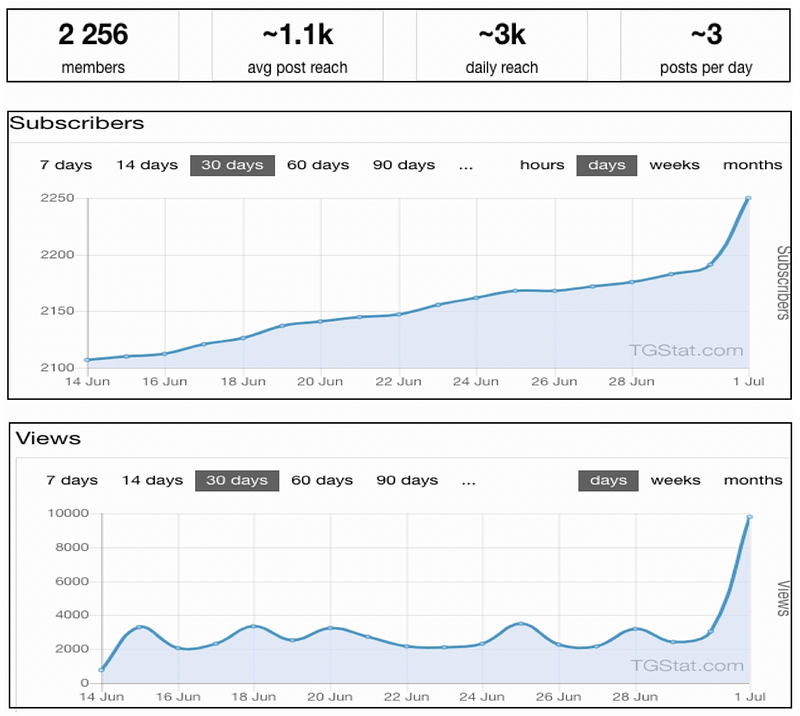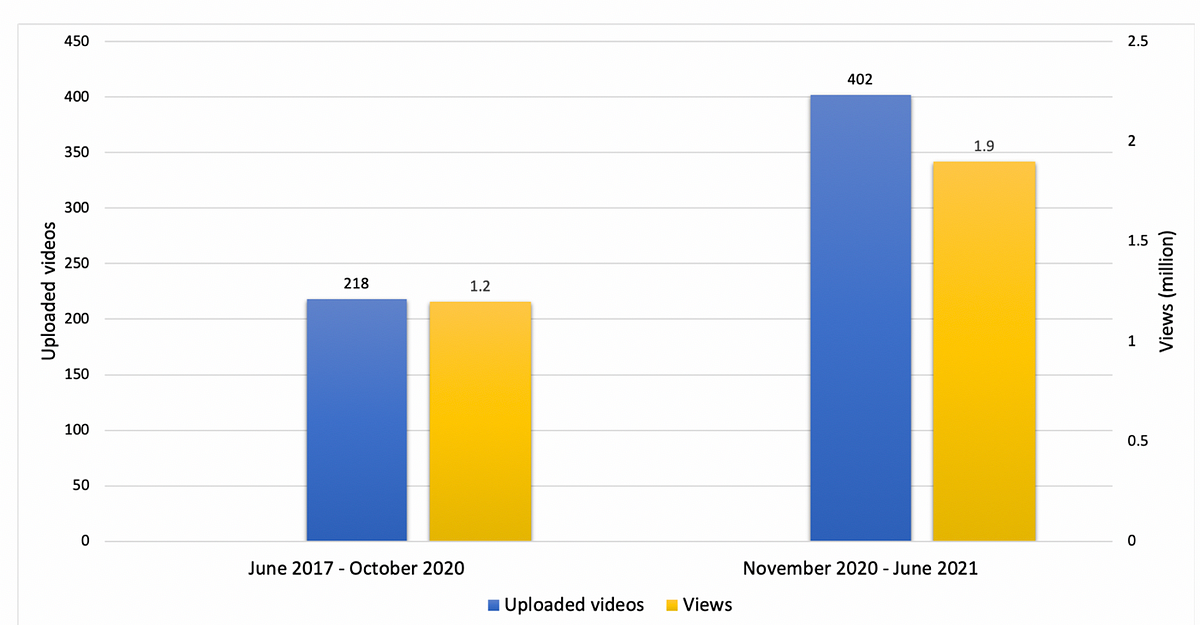Alt-Info asks audiences to follow its accounts on Telegram, WhatsApp, and Viber

By Givi Gigitashvili
In seeking new venues to disseminate its content being de-platformed by Facebook in October 2020, the Georgian far-right group Alt-Info has migrated to encrypted messaging apps that promise no content moderation. At the same time — despite being permanently banned on Facebook — Alt-Info still persists in using the platform to disseminate its content as well as to conduct a campaign against Georgian TV operator Silknet. These latest Alt-Info assets were removed by Facebook in response to this DFRLab investigation.
In October 2020, Facebook removed around 130 assets linked to Alt-Info, which engaged in coordinated inauthentic behavior and used the platform to distribute hyper-partisan and anti-liberal content. In November 2020, Alt-Info created a channel on Telegram, as well as groups in WhatsApp and Viber, and asked its followers to continue watching Alt-Info videos on these platforms. It also created the “Alt-Info” app, which can be used to watch Alt-Info videos and read articles from its website. This move seems to be motivated by the fact that, unlike the mainstream social media platforms (Facebook and Twitter, in particular), encrypted messaging apps have greater challenges when it comes to content moderation policies, and are thus increasingly a safe haven for fringe groups across the political spectrum.
Alt-info’s continued presence on Facebook
After the October 2020 Facebook takedown, Alt-Info founder Konstantine Morgoshia and other team members created new Facebook accounts and launched a “Solidarity to Alt-Info” campaign. In the meantime, a number of new Facebook pages emerged, sharing and amplifying Alt-Info videos and articles on the platform. Facebook subsequently blocked the Alt-Info website in May 2021 as well, disabling the option to share links from website on the platform. In spite of these efforts, Alt-Info continues to disseminate its content on Facebook. On July 1, 2021, though, Alt-Info acknowledged in its Telegram channel that Facebook had once again removed the latest Alt-Info page.
Using the Facebook monitoring tool CrowdTangle, the DFRLab found that the keyword “ალტ-ინფო” (Alt-Info) was mentioned 355 times on Facebook in the six months following the October 2020 takedown. Prior to the takedown, it had been mentioned 4,300 times in posts published between April 23 and October 23, 2020. Nevertheless, even though the number of posts mentioning Alt-Info decreased by a factor of 12 after the takedown, the number of interactions decreased by only a factor of three, indicating that content related to Alt-Info is still circulating on Facebook through assets connected to this organization and these posts garnered more interactions on average after the 2020 takedown.
Similarly, in defiance of the Facebook ban, Alt-Info has recently managed to conduct a boycott campaign on the platform against Georgian TV provider Silknet, after the latter refused to broadcast the Alt-Info TV channel, which launched in January 2021 after receiving a license from Georgia’s Communications Commission. In April 2021, the Communications Commission concluded that Alt-Info TV had used abusive language — which it defines as contributing to the stigmatization of certain groups of people and, in this case, included circulating what it deemed as obscene and inappropriate material for minors — and fined the channel as a result. CrowdTangle analysis showed that posts containing messages about boycotting Silknet were published to 43 Facebook groups and pages on June 12, 2021, and that these posts garnered almost 2,700 interactions.

Alt-Info migrates to encrypted messaging apps
After Facebook took down its network in October 2020, Alt-Info created a Telegram channel on November 18 of that year and asked followers to join it. Its first Telegram post stated that it was most likely that Facebook would not allow them to actively continue operating on this platform, so they had created alternate spaces on Telegram, Viber, and WhatsApp. In May 2021, after Facebook removed yet another Facebook page operated by Alt-Info, the Telegram channel operator wrote that joining Alt-Info’s channel on Telegram would help people to do away with “liberal censorship“ and continue watching Alt-Info content.
Alt-Info mainly promotes its Youtube videos in Telegram channels, garnering around 2,250 followers as of July 2, 2021. Given that Telegram is not a popular platform in Georgia, this number makes their channel one of the largest in terms of followers in the country. As the DFRLab added the channel its TG Analytics tracking list on June 14, 2021, it was not possible to examine prior audience growth trends. However, its audience base steadily grown since that date, with a daily post reach of around 3,000 people, indicating that the channel reaches beyond its core followers.

Notably, channel post views increased dramatically on July 1, when Alt-Info organized violent protests against participants of Tbilisi Pride Week, which kicked off the same day. Ten days earlier, Alt-Info created a new group on Telegram dedicated to organizing a movement against Tbilisi Pride Week. On July 1, Alt-Info TV presenter Zurab Makharadze wrote to the group that LGBT activists were planning to gather at a Tbilisi club and called for Telegram group members to gather there to obstruct the event. Homophobic groups indeed gathered in front of the club and attempted to block the road leading to the club before throwing eggs and bottles at the guests, including foreign diplomats who came to attend Tbilisi Pride event. Zurab Makharadze was leading the crowd and he tried to break the police cordon to get closer to the club; consequently he was arrested together with other people from the crowd.
Alt-Info groups on Viber and WhatsApp
On November 19, 2020, Alt-Info also created a group on Viber, an encrypted messaging app popular in Eastern Europe and Russia. As was the case Telegram, the organization’s first post to Viber explained that since Facebook had blocked Alt-Info, it had created accounts on Viber, WhatsApp, and Telegram to keep in touch with its audience. These new groups would allow Alt-Info supporters to watch its videos even if Facebook permanently blocked its content. In a separate video posted to the Viber group, Alt-Info asked its followers to download Alt-Info videos and upload them to their personal accounts on Facebook so that they would remain available on Facebook, even if Facebook removes Alt-Info’s own network again.
While Alt-Info garnered over 2,500 people on Viber by June 2021, its WhatsApp group has only 166 members, and the content in this group is not updated on a daily basis. The DFRLab also observed that the WhatsApp group administrator has a Spanish country code in its listed phone number and that the group seems to be abandoned, as it has not posted anything new since mid-June, while Alt-Info posts several posts on Telegram and Viber on a daily basis.
Alt-Info on YouTube
Admins of groups in the aforementioned messaging apps predominantly share YouTube links to Alt-Info videos. Via a query to BuzzSumo, a social media listening tool, the DFRLab found that since Facebook took down the Alt-Info network in October 2020, 402 videos had been uploaded on Alt-Info’s YouTube channel as of June 21, 2021, with a total of 1.9 million views. The YouTube channel was created in June 2017 and only featured 218 uploaded videos between June 2017 and October 2020, with 1.2 million total views. This does not mean, however, that Alt-Info started making more videos after the takedown. The group appears to have changed its approach and started cutting large videos into shorter ones after Facebook took down its network, which were subsequently uploaded separately, yielding an increased number of views.

The DFRLab analysis showed that Facebook’s October 2020 takedown of Alt-Info’s inauthentic network pushed the group toward encrypted messaging apps, where content moderation remains a challenge. Far-right groups therefore have more freedom to post hate speech or mobilize supporters toward violent actions on such platforms. Moreover, researchers and law enforcement authorities can monitor unencrypted platforms such as Facebook or Twitter, as there are more open-source tools to monitor such groups.
Givi Gigitashvili is a Research Assistant, Caucasus, with the Digital Forensic Research Lab and is based in Georgia.
Cite this case study:
Givi Gigitashvili, “Georgian far-right group moves to messaging apps after multiple Facebook takedowns,” Digital Forensic Research Lab (DFRLab), July 2, 2021, https://medium.com/dfrlab/georgian-far-right-group-moves-to-messaging-apps-after-multiple-facebook-takedowns-2c6437e30f92.
Follow along for more in-depth analysis from our #DigitalSherlocks.

